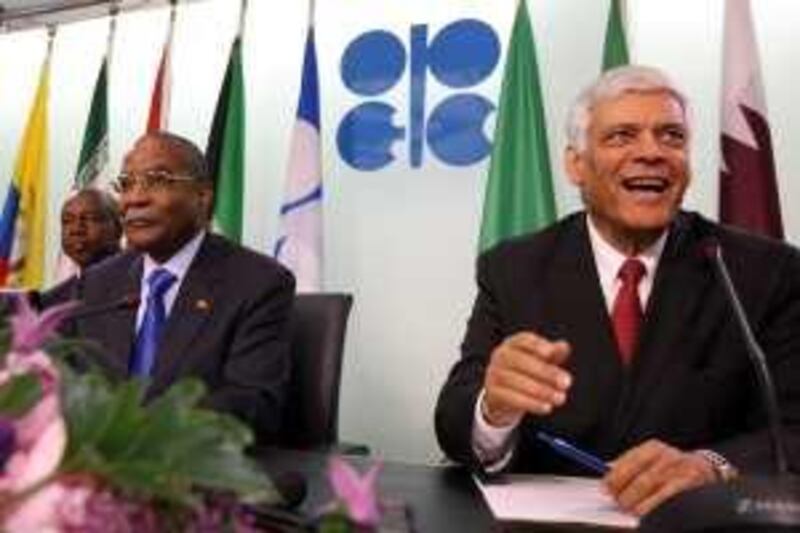VIENNA // OPEC pinned its hopes on an economic recovery to erase a surplus of oil on world markets and decided against deeper cuts in production at a policy meeting Thursday. Ministers took heart from a steady recovery in oil prices, which hit a six-month high of US$64.19 a barrel Thursday, lifted by an influx of speculative capital. Fuel use is falling this year for the first time in 28 years and storage levels in consuming nations are at a 16-year high, but ministers put their faith in a recovery. "The market is oversupplied, but we are looking at a light at the end of the tunnel," said Abdalla el Badri, OPEC's secretary general, after a policy meeting in the Austrian capital. "We see there is a slow recovery and we don't want to give a wrong signal to the economic recovery." Low oil prices are considered a stimulus to economic growth in the world's largest economies, because they leave more cash in consumers' pockets to buy other things. In its communiqué, OPEC said it expected the recession to reach bottom by the end of the year and agreed to meet again in September. Oil prices have been on a roller coaster ride over the past 12 months, reaching a record high of $147 a barrel last July before hitting a five-year low of $32.40 in December, when OPEC agreed to a record output cut. Oil prices have jumped 43 per cent this year even as economic conditions remain bleak. OPEC is benefiting to some extent from speculators who are selling US treasuries and buying oil to insulate their wealth against expectations of a weaker dollar and rising inflation. "We don't want to rock the boat, we want to keep things as they are at this time," Mr el Badri said. Many OPEC delegates were unsure how solid the rally would prove. Shokri Ghanem, Libya's top oil official, said: "Prices are moving because the speculators are back. The market is sending mixed messages. The fundamentals do not tally with the psychology, but we can live with this situation for another two or three months." OPEC cut its official output ceiling last year in three stages, for a total drop of 4.2 million barrels a day (bpd), equivalent to 5 per cent of world supply. But independent data show supplies actually fell by just over 3 million bpd. Rafael Ramirez, Venezuela's minister of energy and petroleum, said he saw an excess supply of a million barrels a day and called for better compliance with the agreed cuts. OPEC's own analysts had told ministers that they needed to reduce output by at least that much to get inventories back to normal levels by the end of the year. But the exporters' group is constrained by internal disagreements over each country's share of the overall ceiling, with Venezuela and Angola both rejecting their quotas as too small. Bill Farren-Price, an analyst with Medley Global Advisors, said he did not rule out a sharp drop in prices if oil fell out of favour with speculators. "Investors are looking for a recovery play and oil is a good one," he said. "But there are half a billion barrels of distressed oil on the market." Optimists took heart in comments by Barack Obama, the US president, who said the US economy was past the worst. Some analysts shared this upbeat assessment. "Our projections show the worst of the economic downturn is behind us," said David Kirsch of PFC Energy. "We don't think we are on the cusp of a strong recovery, but oil demand should stabilise or improve through the second half and result in a substantial draw from commercial inventories for the rest of the year." There is a broad consensus within OPEC on a target of $70 to $80 a barrel, a level which most members see as high enough to balance budgets and encourage investment in new capacity without throttling growth in consuming countries. But Mr Farren-Price said these prices could prove to be too high for a fragile world economy. "There is no evidence that $70 to $80 a barrel is sustainable for the world economy. This is wishful thinking," he said. tashby@thenational.ae
OPEC rules out deeper cut
Ministers decide against deeper cuts in output today, pinning their hopes on an economic recovery to erase a surplus of oil.

Editor's picks
More from the national




